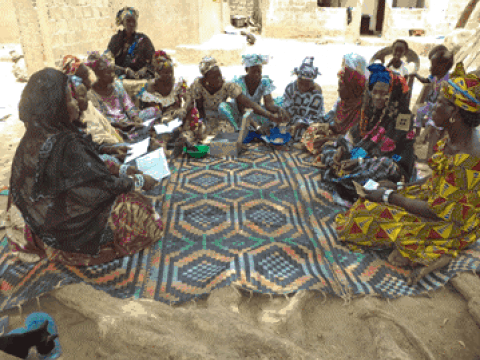
Unlocking the Potential of Faith in Addressing the Climate Emergency
For Earth Day Eu-Lee Chng asks 'How can World Vision and other NGOs empower faith leaders to be change agents in their communities?'
There is growing evidence [1] that faith has a critical role to play in changing mindsets and worldviews, leading to transformation from the personal level to the community level. From my experience supporting Field Offices in scaling Empowered Worldview (EWV), I’ve been struck by the positive impact it has generated among individuals, which led to significant positive changes in the larger community. Individuals explore their faith to gain a renewed identity—a fresh positive vision for themselves. This leads to better stewardship of their assets and the environment.
In the area of environmental stewardship, faith leaders have been actively promoting ethical treatment, care for the environment, and are inspiring everyone else to do the same. At the recent UN climate conference (COP26) in Glasgow, Scotland, faith leaders presented a joint Appeal to the international community to increase their commitment to climate action.
The following are key considerations when engaging faith leaders in addressing climate change and environmental stewardship:
Personal transformation. I’ve introduced how EWV is facilitating personal transformation. The Channels of Hope (CoH) is another model that transform hearts, minds and actions through renewed understanding of religious texts. Faith leaders are encouraged and provided a space to study their texts to reveal how care for creation is an imperative in their faith.
The EWV and CoH approaches can be positioned to promote environmental ethics, for example, by not subjecting creation to abuse and exploitation while promoting unity, trusteeship and accountability. This renewed mindset leads to attitudes and behaviors that can reduce carbon footprint or promote other personal or collective choices that positively impact the planet and other human beings. This is underpinned by a deep sense of duty and love for our neighbour.
Faith community transformation. We have seen over and over again that when faith leaders are personally transformed, equipped and empowered, they use their influence and authority with their congregations and broader community as well. In responding to the Covid-19 pandemic, faith leaders have delivered health messages and supported victims of the pandemic. In the same manner, faith leaders can deliver messages that promote ecological protection in their spheres of influence through prayers and teachings.
Similarly, religious educational institutions such as madrasahs and seminaries can integrate environmental education and theology to help leaders and communities understand the link between their faith and creation. My experience with a madrasah in Bangladesh where children were taught about rights, protection and values leads me to believe that this is an exciting opportunity.
A starting point could be exploring the role of faith in environmental stewardship and climate action with resources such as World Vision’s Environmental Stewardship Theological Brief and the Resource Guide on Climate Change for Religious Communities produced by Religions for Peace which provides both the scientific and religious aspects.
Prayer and Advocacy. Faith leaders have important roles to play in advocacy at the local, national and global levels. World Vision’s Policy Action on Climate Action identifies advocating for global collaboration to adhere to the Paris Agreement and limiting global warming to 1.5⁰C as a key initiative to respond to climate change. With strong relationships with the World Council of Churches, World Evangelical Alliance (WEA) and other interfaith coalitions, World Vision is well positioned as part of global consortia to catalyze global and country level movements. Examples are the WEA climate vigil and the weekend of Prayer and Action against hunger.
At the local level, faith leaders can use their influence through social accountability approaches such as World Vision’s Citizen Voice and Action approach (CVA), to include environmental protection. In a recent study on the inclusion of faith leaders in CVA, there is unanimous agreement that faith leaders have enriched social accountability because of their influential position in their communities and with the government. The trust accorded to them by both parties helped to mobilize communities and create opportunities for communities to strengthen relationships with government.
Partnerships. Multifaith collaborations produces much gain and have the potential to influence policies and mobilize communities. As an example a multifaith collaboration between Partnership on Religion and Sustainable Development (PaRD), World Vision, Islamic Relief, UNEP Faith for Earth, WEA and GoodLands resulted in a call to action for faith leaders to mobilise their communities toward climate action.
World religions share common principles related to environmental ethics in areas like legitimate uses of nature; an obligation for humans to be aware and responsible in living with harmony with the natural world; and moral obligation to both humans and non-human beings. Our track record as an organisation on faith and interfaith partnerships in countries like Bangladesh, Philippines, Central African Republic, Sierra Leone and Bosnia and Herzegovina serves as our strengths and can certainly lead the way for a multifaith approach to addressing environmental degradation in our communities.
As 84% of the world identify with a religious group, faith leaders have a huge role to play in addressing the climate emergency that the world is facing now. As children are asking us to act now, World Vision’s strength in faith engagements is an opportunity to bring about changes in mindsets, attitudes and behavior in promoting better environmental stewardship and climate action for children now and their future.
To learn more about World Vision's faith and development work click here. For more on its work to address the impact of climate change click here
Eu-Lee Chng is the Technical Advisor for Faith and Development at World Vision International's Technical Service Organisation. His role in Faith and Development involves igniting positive impact and sustainable changes in communities that World Vision serves, driven by Christian convictions in relief, development and advocacy.


